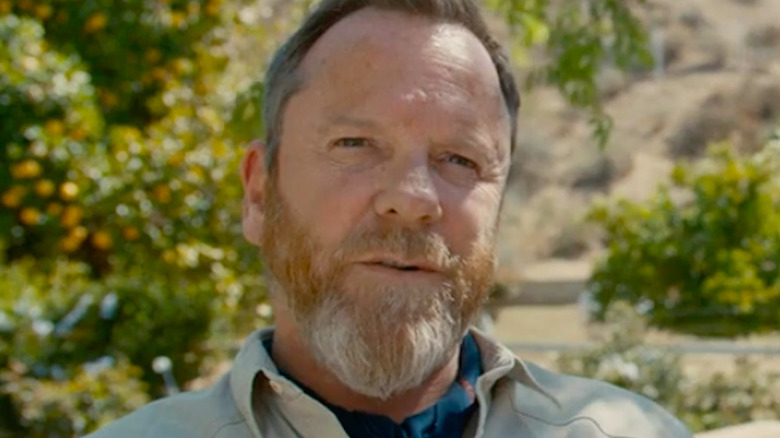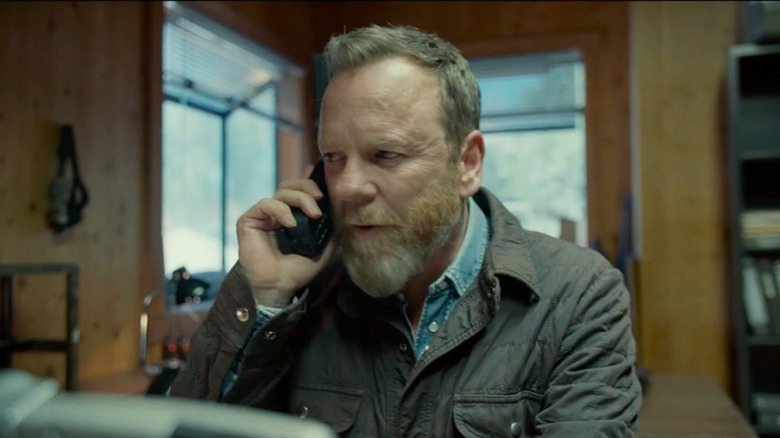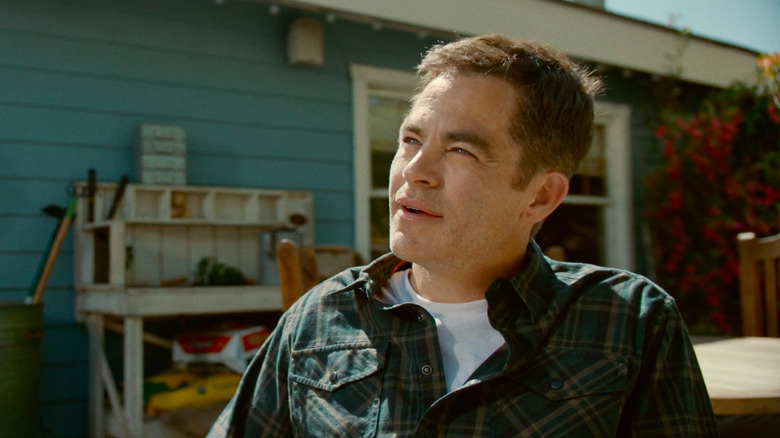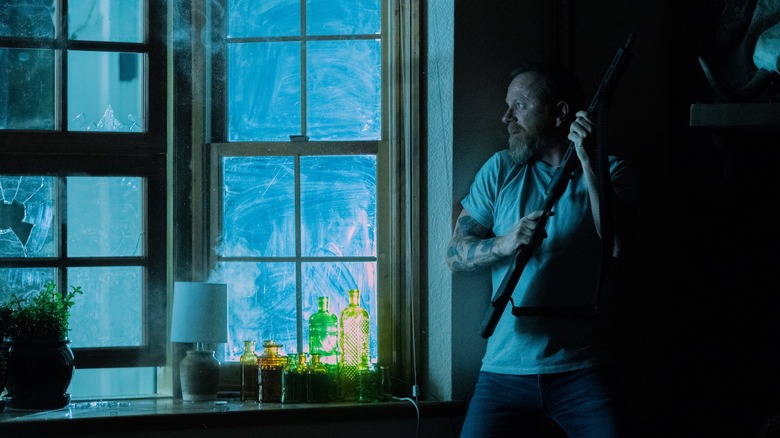Kiefer Sutherland Discusses Choosing Roles, Chris Pine, And The Contractor's Realistic Action - Exclusive Interview
Through the years, we've gotten to know Kiefer Sutherland as everything from a menacingly seductive vampire in "The Lost Boys" to a seemingly meek doctor at the mercy of an alien race in "Dark City" and the determined counterterrorism officer Jack Bauer in "24." That deep well of experience with the actor means we're immediately comfortable with him in whatever role he plays. Sutherland uses his effortless cool and confidence to great effect in his small but impactful role as Rusty, the owner of a military contracting business, in the thriller "The Contractor."
When Chris Pine's James Harper first meets Rusty, they seem like kindred spirits, former elite military officers cast out by the Army and left to fend for themselves. Even though Harper — and the audience — wants to trust everything the charismatic Rusty tells him, when Harper's first mission goes south, it becomes clear that the tales Rusty's told Harper may be just as illusory as those of the Army. In an exclusive interview, Looper spoke to Sutherland about why he wanted to be a part of "The Contractor," the experience of working with Chris Pine, and his secret to performing the movie's raw, realistic action.
Deciding to appear in The Contractor
We've seen you in a lot of roles that are authoritative, someone who can be trusted to do the right thing or at least the wrong thing for the right reasons. Was that a history you wanted to exploit with "The Contractor?"
No. First of all, the reason why I choose one job over another is always going to be the story. Once I find a story that moves me, I almost don't care what character I play, I want to be a part of telling that story. This was no different. I'm a huge fan of the genre of a thriller, and this was written as an A+ thriller.
It also dealt with some things that I wasn't very familiar with. I wasn't that knowledgeable about the unceremonious dismissal of soldiers when they're past their due date and they're kicked to the side of the road, as this character was, leaving him incredibly vulnerable. I also wasn't aware that there are contractors out there that are trying to pick up the brightest and the best that the Special Forces had to offer and use them for private contracting around the world for private corporations. That was an eye-opener, and I wanted to be a part of the film because I thought that those were important things to shine some light on.
The part that was there for me was being this big brother, painting this utopian world, where we could live and do what we love doing, and we'll do it for the right reasons. He's not entirely genuine about that — and I don't want to ruin the film for anybody — but I thought that the predator who's taking advantage of an emotionally vulnerable person, he thinks he's doing it for the right reasons, too. It's an interesting duality to play as an actor, but again, I was excited to be a part of the whole film.
Creating a connection with Chris Pine
You create a connection with Chris Pine in a remarkably short amount of time. How did you work to create that connection and what was it like working with him?
The script was so beautifully written, so 99% of the work is done, and I really do have to tip my hat to that. The thing that I enjoyed working with Chris so much for is that he has an incredible interest about not just how to be authentic from sentence to sentence, but what is the outcome of this scene, and how is it going to impact the outcome of the next scene and the next scene. He's got a very strong overview of what the material is, but also what he wants to extract from it. At the end of that very first scene with us, we want the audience to believe that he's found the perfect world, that he's found a new family, that the Army — who has discarded him, and as sad as that could have been, he's found this beautiful new family. They all have this commonality, this understanding of what it was to be trained to be ultimate soldiers and how we're going to take care of each other now.
We worked together to do that, and it's not just going to happen. We're going to actually focus on his reaction to this, and "What do you need from me? Do you need me to hit that line harder? Is that going to help you do this?" There was a working together between he and I and ["The Contractor" director] Tarik [Saleh] that I just really enjoyed. It was really communicative, and you can always tell when an actor is really interested and excited by what they're doing, and I felt that he really was. That becomes infectious, and I got excited about what I'm doing. I loved working with him.
The key to creating realistic action sequences
You're part of this spectacular action sequence towards the end of the film that's very realistic and down and dirty. You've been involved in that kind of action before with "24." Do you have a particular secret to performing action like that?
It's a combination of fear ... it's [taking] it piece by piece. If you don't understand that it needs to be broken down and filmed piece by piece, you can become quite exasperated very quickly. It's really mechanical in order for everybody to be safe, and it takes time, and it takes experience. I have experience with it, and Chris certainly did and so did Tarik.
Also, again, I can't emphasize enough how nice it was to work with people [who] all listened to each other. The director is always in charge, but when you have a director that's willing to lean into your own expertise, then that's always a really nice situation. It was shot really beautifully. I think Chris had one of those lines that you wait a whole career for, and I can't say what the line is or what he does right after that line, but his work was great in it, and it was a fun thing to be a part of.
"The Contractor" is now playing in select theaters, and is also available on demand and for digital purchase.
This interview has been edited for clarity.



